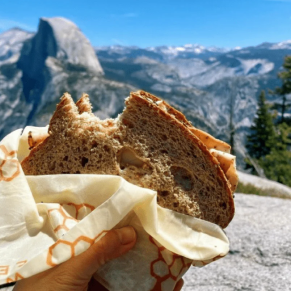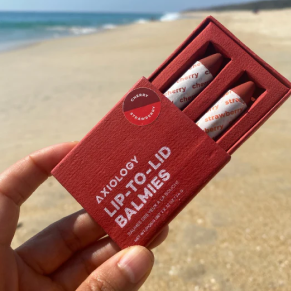Sustainable Brands to Watch: Pioneers in Ethical Consumerism
The most effective sustainable solutions are born from applying innovative — even radical — ideas that address real needs. As the climate crisis intensifies and consumers demand more socially and environmentally-responsible products, more and more brands seek to drive true positive impact.
From recycling kits to food rescue boxes, and even leather made from apple peels and pineapple leaves, — countless revolutionary products are being pioneered by companies dedicated to driving powerful change. Below, we've rounded up some inspiring lifestyle brands that are leading the way and gaining the support of conscious consumers.
LIFESTYLE
There’s no shortage of protein bars out there, each promising different flavors, ingredients, and health benefits. But how many protein bar brands are thinking about sustainability? When Act Bar founder Amelia Allen learned that 34 million Americans face food insecurity every year — while a third of all food in the U.S. goes to waste — she knew something had to change. Every Act Bar purchase donates ½ pound of produce to underserved communities, and the bars are made from upcycled grains that save three gallons of water waste during production. “If we learn to upcycle more, (especially) the by-product of foods we already love that are being produced on a mass scale, and give this food a second chance, we can have a more sustainable food system and also make our food go further,” Allen said.
With growing awareness of how plastics harm both our health and the environment, more people are rethinking the everyday materials they rely on, especially in the kitchen. Although convenient, plastic food wraps have been shown to be a daily source of exposure to microplastics leaking into food. To create a sustainable, healthier solution, Bees Wrap founder, Sarah Kaeck, turned to bees for inspiration. Kaeck infused organic cotton with a blend of beeswax, plant oil, and tree resin, to create a durable yet pliable beeswax food wrap that could be used again and again. Switching from plastic wrap to reusable Bees Wrap is a small swap with a big impact — just one pack of Bees Wrap can save 1,667 sq. feet of plastic wrap from entering our oceans and landfills each year, which is enough plastic to cover a single-family home.
After learning that 20 billion toothpaste tubes are made every year (and most are unrecyclable) Huppy founders David Phan and Cathy Tran set out to create an effective, natural, plastic-free toothpaste solution. Cue Huppy — plastic-free toothpaste tabs that foam up with water and come in a refillable, recyclable tin. Everything surrounding the tabs is fully biodegradable or recyclable, right down to their water-based inks. “By offering a zero-waste and plastic-free option, we hope to empower others to make conscious choices that leave the world a better place for future generations,” said Phan. Switching to toothpaste tabs is a small way consumers can have a big impact, which is certainly something to flash a big, white smile about.
Founded by a young group of Danish entrepreneurs in 2016, Too Good to Go was created as a scalable solution to fight food waste. The company proudly operates a “win-win-win” model, allowing businesses to make revenue off surplus food, and customers to access this food at a low price, all while reducing food from reaching landfills. In nine years, the company has grown to over 100 million registered users and 175,000 business partners across 19 countries in Europe and North America. The impact has been profound — helping to save over 400 million meals from being wasted, the equivalent of 1.1M tons of CO2e avoided. The company’s success has been supported by its social media virality, as many users have taken to social media to do exciting hauls of their Too Good to Go surprise bags.
The shiny new phones in our back pockets and the latest release headphones on our wishlists, often come with an overlooked environmental cost. From socially and environmentally murky mining supply chains, to resource-intensive manufacturing processes, and end-of-life impact — new tech production and e-waste are increasingly urgent environmental issues. With greenhouse gas (GHG) emission reduction goals set forth by the International Panel on Climate Change (IPCC), e-waste’s 74 million metric tons of C02e by 2030 projected emissions is a pressing issue.¹ To address this, Back Market is providing a marketplace for refurbished devices, seeking to keep materials in circularity while delivering great value to customers. According to the company, a refurbished smartphone uses 91.3% less raw materials, 86.4% less water, generates 89% less e-waste, and puts 91.6% less CO2e emissions into our atmosphere compared to brand new.
FASHION AND BEAUTY
By now, the far-reaching implications of the overproduction clothing crisis are becoming increasingly urgent. With recent estimates of over 100B garments produced each year, with 73% going to landfill or being incinerated, experts suggest we have enough clothing in existence right now to clothe the next six generations of humanity.² Extending the life of clothing is an important way to fight fashion waste, which is why Thred Up co-founder James Reinhart set out to “modernize thrifting.” The app operates as an online consignment and thrift store, allowing users to refresh their wardrobes without creating new waste. Thred Up’s impact since its founding is noteworthy with 666M lbs of CO2e avoided and $5.3B saved off estimated retail prices. Their signature “Clean Out” bags also help users responsibly dispose of pieces as the company makes sure anything that can’t be sold is properly recycled.
The denim industry has notoriously been linked to a high environmental load due to intense water use, chemical-laden dyeing and texturing processes. Now, there’s also a mass production issue, with four billion pairs of jeans produced annually. Launched in 2018, E.L.V. Denim — which stands for East London Vintage Denim — was founded on an ethos of conscious design, local manufacturing, and slow production. Using 100 percent recycled fabrics, E.L.V breathes new life into material with the goal of providing high-quality designs, luxury tailoring, made to last a lifetime. “Even waste can become beauty,” says E.L.V. designer Anna Foster.
Since its inception in 2009, Reformation set out with a mission to fill a gap in the market by bringing trend-forward sustainable fashion “to everyone.” Offering pieces made with lower-impact materials in more sustainable processes, Reformation was a pioneer in showing fashion and sustainability could go hand in hand. In step with the values of their customer demographic — primarily conscious millennial and Gen-Z women — Reformation has become known for engaging in activism, climate action, and women empowerment. Last year, Glossy awarded the brand with the Best Brand Marketing Campaign award for their “You’ve Got the Power” campaign with activist Monica Lewinsky, urging audiences to embrace their influence at the polls. Reformation provides quarterly report updates across people, planet, product, and progress to substantiate their commitments and hold themselves accountable.
Nearly two decades ago, Nick Savaidis founded Etiko in Melbourne, Australia, after being unable to find ethical, sustainably-made clothing. Since then, the brand has become a leader in the ethical fashion space — creating products in fair and transparent supply chains; supporting human rights and labor conditions; and championing environmental stewardship. Etiko holds some of the industry’s highest regarded certifications, including the Global Organic Textile Standard (GOTS), B Corporation status, and Fairtrade. They also hold a “great” rating from Good On You.
The story behind vegan, plastic-free beauty brand, Axiology, is one of true personal purpose. After Erika Rodriguez learned that all her makeup had been tested on animals, she turned to YouTube videos and DIY books to learn how to make her own vegan lipsticks. After a few years of experimenting, she successfully launched Axiology landing her at retailers around the world. Once learning that the beauty industry creates 120 billion units of packaging waste every year, Rodriguez ditched all plastic across their entire product line — a rare feat in the industry. To further its impact, all Axiology boxes are made with 100% island trash — a product of their partnership with a women’s cooperative in Bali that turns paper trash into beautiful packaging, while providing stable work and fair wages to women on the island.
As is always the case with sustainable living, the real value isn’t in throwing out everything we own and buying all new sustainable products. Rather, orienting ourselves around consuming less and more mindfully, making gradual swaps over time, sharing our journeys with family and friends, and giving ourselves grace along the way.
Sources
1 Janderheart, K. (2024, October 9).More plastic than fish. Back Market and the Environment: The Eco-Friendly Choice for Tech. TopBubbleIndex. Retrieved April 18, 2025, from https://www.topbubbleindex.com/blog/back-market-sustainability/
2 Horvath, K., & Meiffren-Swango, C. (2024, September 24). We have enough clothing on the planet right now for the next six generations. PIRG. Retrieved April 18, 2025,from https://pirg.org/california/articles/we-have-enough-clothing-on-the-planet-right-now-for-the-next-six-generations/












